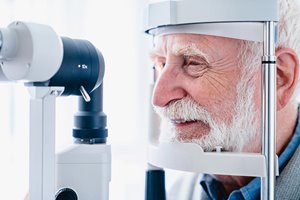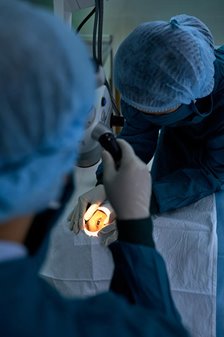 Cataract surgery is one of the most common procedures in the world—according to the National Institutes of Health (NIH), it "is the most prevalent surgical procedure of all medical specialties with an estimated 3.7 million cases per year in the USA." However, traditional cataract surgery involves a strict and complex eye drop regimen, which can be difficult to adhere to and often presents the biggest barrier to a successful recovery.
Cataract surgery is one of the most common procedures in the world—according to the National Institutes of Health (NIH), it "is the most prevalent surgical procedure of all medical specialties with an estimated 3.7 million cases per year in the USA." However, traditional cataract surgery involves a strict and complex eye drop regimen, which can be difficult to adhere to and often presents the biggest barrier to a successful recovery.
Now, in collaboration with Dr. Alexander Foster, a Comprehensive Ophthalmologist and Refractive Cataract Surgeon at BayCare Clinic Eye Specialists—part of Aurora BayCare Health Center in Green Bay—DCMC offers dropless cataract surgery, an exciting innovation and treatment alternative that reduces the need for the pre- and post-operative eye drops used in conjunction with cataract surgery.
•
According to the World Health Organization (WHO) over 1 billion people worldwide suffer from "moderate or severe distance vision impairment or blindness," and of that total, "Cataracts account for more than 51% of blindness"—roughly 94 million cases. In the United States alone, the American Academy of Ophthalmology (AAO) estimates that, "Cataracts affect more than 24.4 million Americans aged 40 and older," and that, "By age 75, approximately half of all Americans have [developed] cataracts."
What are cataracts?
Cataracts are a medical condition that affects the eyes—more specifically, the lens of the eye. Inside of our eyes, there is a natural lens that works with the cornea (the transparent part of the eye that covers the iris and pupil) to focus light correctly onto the retina (the back of the eye).
The lens is normally clear—akin to a lens on a camera—allowing the image of the world a person is seeing to "project" clearly into the eye. When a person develops a cataract in one eye (or cataracts in both eyes), the lens becomes foggy, or milky-white. In fact, the term cataract is derived from the Latin word for waterfall (cataracta). Appropriately, fast moving water turns from clear to white in a manner similar to the much slower transition from clear to white that is seen in the lens as this disease progresses.
What are the symptoms of cataracts?
Most age-related cases of cataracts take years to develop, and early on, cataract symptoms may be minimal to non-existent, but as fogginess in the lens increases over time, symptoms can include:
- Blurred or cloudy vision
- Difficulty reading or seeing at night
- Sensitivity to light and glare
- Double vision
- Colors appearing faded or yellowed
- Seeing halos around lights
What causes cataracts?
 In most cases, cataracts develop as a result of the aging process—when we are young, the lens of the eye is clear, but starting around age 40, proteins in the lens start to break down and clump together, which leads to clouding and a loss of transparency. Over time, as the protein breakdown becomes more widespread, the difference in vision becomes increasingly noticeable.
In most cases, cataracts develop as a result of the aging process—when we are young, the lens of the eye is clear, but starting around age 40, proteins in the lens start to break down and clump together, which leads to clouding and a loss of transparency. Over time, as the protein breakdown becomes more widespread, the difference in vision becomes increasingly noticeable.
Other causes of cataracts include:
-
Genetics: In some cases, cataracts may be inherited.
-
Environmental factors: Exposure to ultraviolet radiation from the sun or other sources, smoking, and poor nutrition may all contribute to cataract formation.
-
Medical conditions: Diabetes, high blood pressure, and other medical conditions can increase the risk of cataracts.
-
Eye injuries or surgeries: Trauma to the eye or previous eye surgery can also increase the risk of cataracts.
-
Medications: Certain medications, such as corticosteroids, may increase the risk of cataracts.
Overall, the exact cause of cataracts is not always clear and may be influenced by a combination of factors mentioned above.
What are my options if I have, or if I am, developing cataracts?
 Early on in the disease progression, common treatments for cataracts are generally non-invasive and can include:
Early on in the disease progression, common treatments for cataracts are generally non-invasive and can include:
-
Glasses or contact lenses: a new prescription for glasses or contact lenses can help improve vision.
-
Brighter lighting: Increasing the amount of light in your environment can help make it easier to see, especially when reading or doing other close-up tasks.
-
Magnifying lenses: These lenses can help improve vision for tasks that require close-up work, such as reading or sewing.
However, once the disease progresses to the point that it interferes with normal, daily activities, or with the treatment of a different eye problem, your eye care professional may recommend cataract surgery—an extremely common procedure whereby the lens of the eye is removed and typically replaced by an artificial (or synthetic) lens—called an intraocular lens, or IOL. Cataract surgery is generally an outpatient procedure, meaning the patient can go home the same day as the procedure.
Dropless cataract surgery is now available at Door County Medical Center
 While traditional cataract surgery is very safe and effective, the biggest hurdle for most patients is maintaining the rigorous schedule of antibiotic and anti-inflammatory eye drops that precede and follow the procedure—eye drops being self-administered several times a days, at very specific intervals, 2 days before the procedure and for a period of around 3 weeks after the procedure.
While traditional cataract surgery is very safe and effective, the biggest hurdle for most patients is maintaining the rigorous schedule of antibiotic and anti-inflammatory eye drops that precede and follow the procedure—eye drops being self-administered several times a days, at very specific intervals, 2 days before the procedure and for a period of around 3 weeks after the procedure.
Indeed, as important as these drops are in preventing post-op infection and inflammation, difficulty maintaining this schedule poses a real problem—an NIH survey found that, when it came to adhering to a post-operative eye drop schedule, only half of monitored patients achieved a compliance rate of above 50%.
With dropless cataract surgery, the need for pre-op and post-op eye drops—as the name implies—is eliminated. Here's how dropless cataract surgery works:
At the time of the cataract surgery—after the lens has been removed and replaced with the IOL—your surgeon will apply a small amount of antibiotic in the eye and a small amount of steroid outside of the eye. This ensures infection and inflammation are properly treated with minimal side effects.
There are several benefits to this approach, which include:
-
Consistent medication delivery: With traditional cataract surgery, patients are likely to miss doses of their eye drops, which affect recovery. Dropless cataract surgery ensures that patients receive the medication they need consistently throughout the recovery period. This leads to…
-
Improved patient compliance: Because patients do not need to worry about using eye drops before and after surgery, they may be more likely to comply with other post-surgery instructions, such as avoiding strenuous activities and attending follow-up appointments. Improved patient compliance also leads to…
-
Reduced risk of infection: One of the major benefits of dropless cataract surgery is that it can reduce the risk of infection after surgery. This is because the medication used during the surgery is injected directly into the eye, which can provide a more targeted and effective approach to preventing infection.
-
Cost-effective: Since patients do not need to purchase eye drops, dropless cataract surgery can be more cost-effective compared to traditional cataract surgery.
"Dropless cataract surgery is a clear win," Dr. Foster states, "It has proven very efficacious in preventing infection, sequestering inflammation, lowering healthcare cost, and drastically improving patient outcomes. It's also very cost effective for the patient compared to standard cataract surgery," he notes, adding, "It is the future of cataract surgery and at BayCare Clinic Eye Specialists, we strive to stay on the cutting edge of surgical innovation—if it benefits the patient, we are going to do it."
•
People are highly visual, and perhaps more than any other sense, we rely on our eyes—indeed a survey conducted by the NIH found 88% of respondents ranked vision as their most valuable sense. Unfortunately, our eyes, like any other part of our body, are not immune from the effects of age or disease.
If cataracts have progressed to the point where it is affecting your ability to be involved in all that life has to offer, it may be time to consider dropless cataract surgery—an effective and convenient way to restore your eyesight quickly.
To inquire about dropless cataract surgery at Door County Medical Center, please contact BayCare Clinic Eye Specialists at (877) 462-9465 or visit their website at https://www.baycare.net/medical-services/eye-specialists/ to set up an appointment at BayCare Clinic's Sturgeon Bay location.